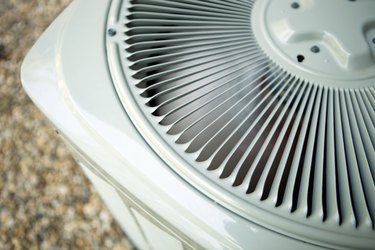
When building or remodeling a house with central air conditioning in it, don't assume units are the same and go with the best bargain. There are many factors to consider and none of them is more important than the size of the central air unit. For proper efficiency and operation in your 1,300-square-foot house, size the central air unit to the house and the cooling needs based on the cooler's output and not its physical dimensions.
British Thermal Units
Video of the Day
The size of a central cooling unit has little to do with its physical dimensions. Instead, the size refers to British Thermal Units it produces. BTUs are the standard by which air conditioners and their cooling capacity are measured. The amount of energy in 1 BTU is the same amount needed to raise the temperature of 1 pound of water by 1 degree Fahrenheit. This energy standard is what you'll look at to determine how "big" the central unit is and what it can accomplish.
Video of the Day
The 1,300-Square-Foot Answer
When looking for the quick answer to how much air-conditioning power you'll need to adequately cool a 1,300-square-foot space, the answer is 23,000 BTUs per hour of air conditioning power. This is the base capacity needed for a 1,200- to 1,400-square-foot house. You should also look for a unit that has at least an 11.6 Seasonal Energy Efficiency Ratio that determines how efficient your system is in the hottest weather. Manufacturers only produce air conditioners with a SEER rating of 13 or higher today, so new units exceed this minimum requirement.
Factors To Consider
The square footage in your home is not the only factor that matters when choosing a central air system. Consider other variables that could make your home tougher or easier to cool. A heavily shaded home may require 10 percent less energy to cool. On the other hand, lots of windows, little shade, and a sunny climate may have the opposite effect.
Heat-generating appliances can also impact the sizing. If a kitchen is used regularly for cooking, then it can also significantly increase the energy needs for cooling. Lots of other heat-generating appliances that you use frequently can have the same impact. Other factors include the climate, ductwork, number of people living in the home, and insulation, which can all impact how much cooling power the unit needs to keep the home comfortable.
Too Much or Too Little
It might seem logical to just buy the biggest thing you can afford, whether you're choosing a window air conditioner or a central air unit. But having an improperly sized central air conditioner has negative effects regardless of whether it has too much or too little capacity.
Too little capacity means the air conditioner will have to run constantly to cool the house, causing higher electric bills and potentially a home that's too warm. If the central air unit is too large, it will cool too fast, run short cycles, and not remove the humidity from the air, which is a significant part of the air conditioning process.